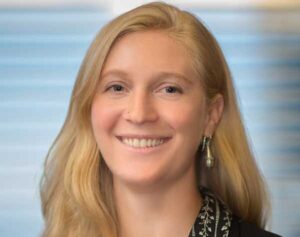 Though Emily Lewis has now been practicing water law for 15 years, her love of the outdoors originally spawned a different career.
Though Emily Lewis has now been practicing water law for 15 years, her love of the outdoors originally spawned a different career.
“I was a raft guide for many years and found it fascinating to be on the river and watch the river levels fluctuate. You could actually taste how the river water was different at different levels. Because of my firsthand experience on river systems in the West, I knew I wanted to be studying water at a more academic level,” she recalls. “I specifically chose Utah Law to study environmental law and water law. I was a nontraditional student because I had a clear idea of what I wanted to do, and I chose a law school based on that criteria.”
The Wallace Stegner Center for Land, Resources and the Environment‘s reputation in environmental law appealed to Lewis, as well as the small class sizes.
“I really enjoyed law school. I had several classes that had 10 students or less, so I got to know professors. We are still good friends 15 years later, and I communicate through email with them and have warm exchanges at events,” Lewis says. “We had a large variety of classes about natural resources law, including oil, gas, mining, Indian law, and water law. I actually took a climate change class twice because it was so interesting. I could cater my class load to my interests while still taking general law classes.”
Attending the Stegner Center’s Green Bag lunches was also a highlight of Lewis’ time in law school.
“I like that the Stegner Center really strives to bring topical speakers to the school. I went to a lot of the Green Bag lunches because they discussed practical application of law and contemporary topics,” she says. “I like maintaining a connection to law school. There is different track for academia and practicing lawyers, so the more we can connect the school with practitioners, the healthier it is for legal communication. By welcoming practitioners to participate in Stegner programs, especially the symposium, the law school keeps a presence in the legal community and the state.”
Lewis has served as an adjunct water law professor at the College of Law since 2018 and says she enjoys having a mix of students who are very interested in water law and others who want to take a different class for variety.
“As a practitioner, I love having students see what is actually happening within water law. We look at a map of water rate falls and work on actual change applications and pleadings they would see in practice. I also have at least one field day in my class, which is so helpful,” Lewis says. “It is a great way to introduce students to a conversation about water and natural resources and get some cool new topical things in front of them. We need bright minds thinking about and excited about practicing natural resources and water law.”
Making water law interesting and relevant to everyone is one of Lewis’ focuses and was the catalyst for her podcast Ripple Effect, which she started in 2020.
“I released the first three episodes of Ripple Effect in March 2020, right before the world shut down due to the pandemic. It ended up being fortuitous timing, because I’ve been able to connect not only with local audiences but with national and international audiences,” Lewis explains. “I talk to people doing interesting things, and in a way it’s like the interesting conversations you have in a hallway at a conference. I have spoken to people in a wide variety of fields, including tech, finance, and policy. We cast a broad net about anything that remotely touches water.”
She also serves as Utah Water Banking project manager, working to educate stakeholders about the Utah Water Banking Act and promoting water leasing arrangements in the state.
“I’m most proud of the fact that I have found a unique way to express personality and authenticity that is helpful to me and the legal community through special projects and the podcast. Part of my law practice is traditional, but a lot of it is not. I’m glad I’ve had the support of my law firm and community to branch out and do things that interest me, taking small risks that turn into big rewards,” she says. “Law can be stifling, so if you can find a way to make it work and feel you’re constantly excelling, I think that is a success.”
Lewis wants to continue taking on special projects and focusing on the intersection of policy, water markets and innovative conservation efforts.
“I want to look at big, collaborative solutions to water problems and continue making foundational changes to Utah water law,” she says. “We need to take advantage of the momentum we’ve experienced over the last few years and continue to make innovative and impactful changes.”
She also wants students and young practitioners within environmental law to remember that the practice is difficult and not to get down on themselves.
“Take a step back and look at what you’ve accomplished instead of how much you have to do. It can be a very hard profession, and finding ways earlier in your career to navigate the practice of law that keeps you a happy and healthy person is important,” she says.
Utah Law has a strong environmental and natural resources program, Lewis notes, but students, faculty and staff must work together to keep it that way.
“The environmental law program needs tending to make sure it continues to grow,” she says. “We have the perfect location and a great platform to build from. It is an exciting program, but that takes some commitment from everybody.”
Learn more about the Wallace Stegner Center programs.
